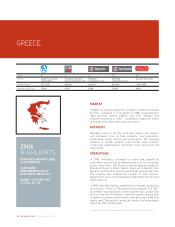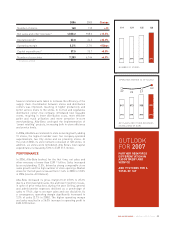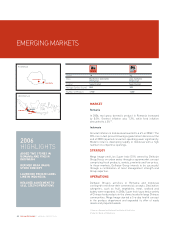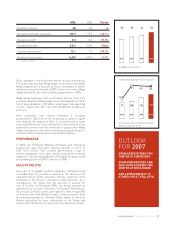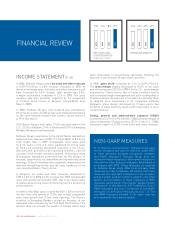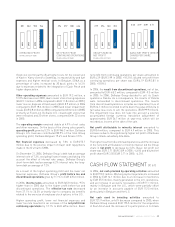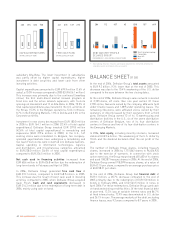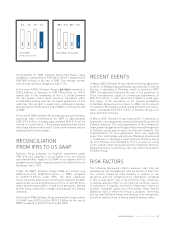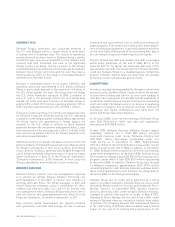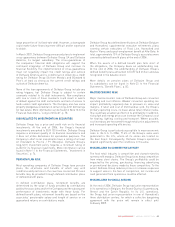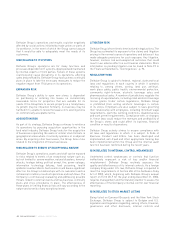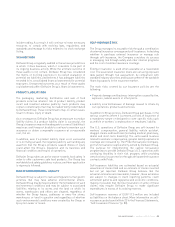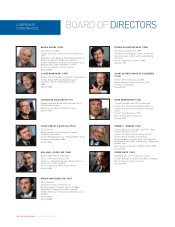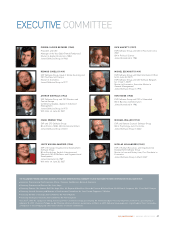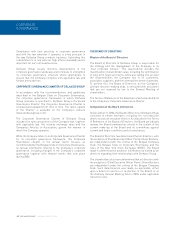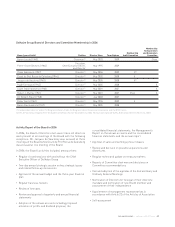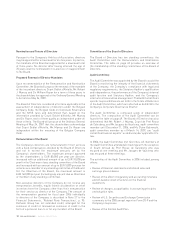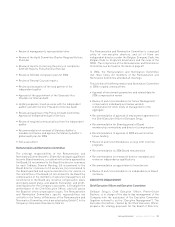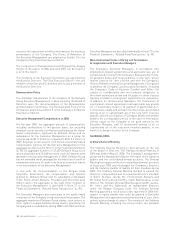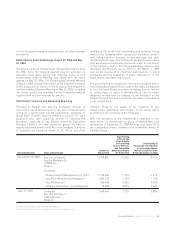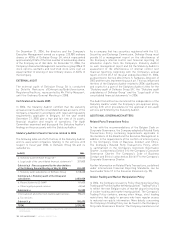Food Lion 2006 Annual Report Download - page 46
Download and view the complete annual report
Please find page 46 of the 2006 Food Lion annual report below. You can navigate through the pages in the report by either clicking on the pages listed below, or by using the keyword search tool below to find specific information within the annual report.DELHAIZE GROUP / ANNUAL REPORT 2006
44
Delhaize Group’s operations and results could be negatively
affected by social actions initiated by trade unions or parts of
its workforce, in the event of which the Group cannot assure
that it would be able to adequately meet the needs of its
customers.
RISK RELATED TO IT SYSTEMS
Delhaize Group’s operations are for many functions and
processes dependent on IT systems, developed and maintained
by internal experts or third parties. Failure of these systems
could possibly cause disruptions in its operations, affecting
sales and profi tability. Delhaize Group has business continuity
plans in place to take the necessary measures to reduce the
negative impact from IT failures on its operations.
EXPANSION RISK
Delhaize Group’s ability to open new stores is dependent
on purchasing or entering into leases on commercially
reasonable terms for properties that are suitable for its
needs. If the Group fails to secure property on a timely basis,
its growth may be impaired. Similarly, its business may be
harmed if it is unable to renew the leases on its existing stores
on commercially acceptable terms.
ACQUISITION RISK
As part of its strategy, Delhaize Group continues to reinforce
its operations by pursuing acquisition opportunities in the
food retail industry. Delhaize Group looks for the acquisition
of businesses operating the same or similar store formats in
geographical areas where it currently operates or in adjacent
areas. By acquiring other businesses, the Group faces risks
related to the integration of these businesses.
RISK RELATED TO EVENTS OF EXCEPTIONAL NATURE
Delhaize Group’s operations, assets and staff can be exposed
to risks related to events of an exceptional nature such as,
but not limited to: severe weather, natural disasters, terrorist
attacks, hostage taking, political unrest, fi re, power outages,
information technology failures, food poisoning, health
epidemics and accidents. Such events could have a signifi cant
effect on the Group’s relationships with its customers and on
its fi nancial condition, results of operations and cash fl ows. The
Company is continuously evaluating and addressing possible
threats linked to external events and has business continuity
plans and crisis procedures in place. The effectiveness of
these plans in limiting fi nancial loss will vary according to the
nature and severity of any exceptional event.
LITIGATION RISK
Delhaize Group is from time to time involved in legal actions. The
Group has estimated its exposure to the claims and litigation
arising in the normal course of operations and believes it has
made adequate provisions for such exposure. Any litigation,
however, involves risk and unexpected outcomes that could
result in an adverse effect on our fi nancial statements. More
information on pending litigation can be found in Note 39 to
the Financial Statements, “Contingencies”, p. 96.
REGULATORY RISK
Delhaize Group is subject to federal, regional, state and local
laws and regulations in each country in which it operates
relating to, among others, zoning, land use, antitrust,
work place safety, public health, environmental protection,
community right-to-know, alcoholic beverage sales and
pharmaceutical sales. A number of jurisdictions regulate the
licensing of supermarkets, including retail alcoholic beverage
license grants. Under certain regulations, Delhaize Group
is prohibited from selling alcoholic beverages in certain
of its stores. Employers are also subject to laws governing
their relationship with employees, including minimum wage
requirements, overtime, working conditions, disabled access
and work permit requirements. Compliance with, or changes
in, these laws could reduce the revenues and profi tability of
the Group’s stores and could affect its business, fi nancial
condition or results of operations.
Delhaize Group actively strives to ensure compliance with
all laws and regulations to which it is subject. A Code of
Business Conduct and Ethics has been developed and
implemented, anti-fraud and other appropriate training has
been implemented within the Group and the internal audit
function has been reinforced during the recent years.
RISK RELATED TO INTERNAL CONTROL WEAKNESSES
Undetected control weaknesses or controls that function
ineffectively represent a risk of loss and/or fi nancial
misstatement. Delhaize Group routinely assesses the
quality and effectiveness of its internal controls. As a foreign
company fi ling under U.S. law, Delhaize Group is required to
meet the requirements of Section 404 of the Sarbanes-Oxley
Act of 2002, which, beginning with Delhaize Group’s annual
report on Form 20-F for the year ending December 31, 2006,
requires management and the Statutory Auditor to assess the
effectiveness of the Company’s internal control over fi nancial
reporting.
RISK RELATED TO STOCK MARKET LISTING
Being listed on Euronext Brussels and the New York Stock
Exchange, Delhaize Group is subject to Belgian and U.S.
legislation and regulation regarding, among others, fi nancial,
governance and other disclosure, internal controls and


